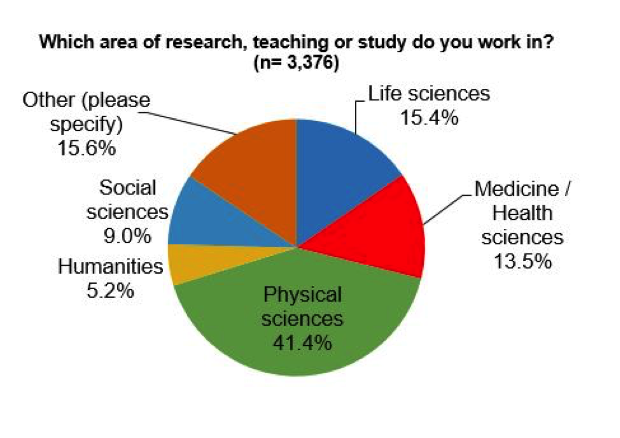We’ve completed work on the preliminary results of our recent survey on community perceptions and understanding of ORCID, and they make for interesting reading. We had a fantastic response – close to 6,000 people (including many of you – thank you!) – the vast majority of whom (over 90%) work in research institutions. This includes researchers (65%), professors/lecturers (42%), and students (14%) – note, respondents were allowed to select two options. Most respondents (70%) have an ORCID iD. The largest number of responses came via the ORCID Registry (52%). In addition, we are grateful to the American Geophysical Union, IEEE, FASEB, and Modern Language Association, all of whom promoted the survey to their members. The breakdown by discipline is shown in the chart below; responses by region broadly reflected the global distribution of researchers.

Our key learning points so far include:
- Respondents were most likely to have heard about ORCID through a colleague recommendation (31%) or a publisher (29%).
- Most researchers registered for an ID during manuscript submission or because their university asked them to. Even so, researchers are not well aware of the connection between membership and requesting permissions to access their record, suggesting that we may need to do more to explain that researchers control their record.
- Respondents with ORCID iDs are most likely to use their iD during manuscript submission (55%) and 43% were prompted to supply it last time they submitted an article. Over a quarter (26%) use their iD at their university, and 14% use it in grant submissions.
- Four of the top five research contributions that respondents expect to be able to connect with their ORCID iD are publications. Beyond this, there were some differences by discipline, with respondents from physical, life, and social sciences expecting to connect datasets, while those working in medicine favored peer review, and in humanities, presentations.
- Nearly two thirds of respondents with ORCID iDs (62%) believe that ORCID is important because “persistent identifiers are a way of helping the internet work better for research”. When all respondents, including those who had not yet registered, were asked a similar question, 80% rated as most important or somewhat important that ORCID iDs are free to researchers, useful for connecting their research to themselves, and make it easier for people to find and share their work, indicating a level of altruism is involved in the decision to register. That said, throughout the survey, responses clearly demonstrated that we need to improve awareness and understanding of ORCID, and in particular that the primary thing researchers need to do, after registering, is to use their iD.
- The top attributes respondents associated with ORCID were largely positive: (in order) open, new, approachable, efficient, easy to work with. Fewer than 5% of respondents saw ORCID as unnecessary, hard to work with, awkward, and complicated.
- Among respondents, 18% knew that their employer was a member. When asked why their organization should integrate ORCID iDs, the most popular answer was benefiting from a community approach to adopting iDs.
- There’s more support than we expected for organizations to mandate the use of ORCID, particularly in publishing systems. 72% of respondents agreed or strongly agreed that mandating use of ORCID iDs would benefit the global research community; 21% were neutral, and only 7% disagreed or strongly disagreed. Similarly, between two thirds and three quarters would find it useful if their publisher (75%), institution (67%), funder (67%), or professional society (64%) mandated the use ORCID iDs in submission, application, or membership systems.
We’ll be delving into more detail by region, discipline, and sector in the full report, which we’ll be publishing together with the anonymized data in a few weeks’ time. In the meantime, please feel free to send any comments or suggestions to [email protected].
